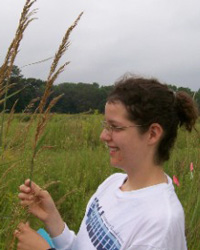Elizabeth Bach ’07
Elizabeth Bach ’07 earned a prestigious McElroy Fellowship as a Cornell senior, and is now studying prairie soil ecology as a graduate student at Southern Illinois University. At Cornell she majored in biology and environmental studies, with a minor in chemistry.

What are you studying in graduate school?
My thesis project is investigating changes in soil microbial communities over time in fields enrolled in the Conservation Reserve Program and comparing these communities with microbial communities in crop fields and native prairie remnants. This research is really in the realm of biogeochemistry, which is the study of the chemical interactions between the biotic and abiotic worlds. In a nutshell, nutrient cycles.
What research did you do while at Cornell?
I did an independent research project in the summer of 2005 at a prairie remnant site. The block plan enabled me to take some independent study blocks before and after the summer to develop and finish the project. Cornell’s academic community was a huge asset. I could talk with professors in Biology, Chemistry, and Geology and incorporate knowledge from all those fields in learning about soils.
In the summer of 2006, I participated in a Research Experience for Undergraduates (REU), at Kansas State University. This was an amazing experience! I got to work with leading researchers in the field of soil microbial ecology and tallgrass prairie restoration. I was one of 10 students selected from over 120 applicants from around the country to participate in the REU, and I owe that honor to my experiences at Cornell. Coming back to Cornell, I was able to continue my experience and complete an honors project based on my research at Konza Prairie.
What was best about Biology and Env Studies at Cornell?
I absolutely loved Cornell and my experiences in my majors. My ecology class with Bob Black in the Boundary Waters of Minnesota was a particularly enriching experience. Marty Condon’s plant morphology course really sparked my interest in prairies, prairie plants, and plant/soil interactions. The microbiology course I took with Jeff Cardon in Georgia was especially relevant — it gave me a really strong foundation in microbial ecology that most students (even at large universities) don’t have.
In what other ways did Cornell prepare you for graduate school?
I gave presentations in almost every class at Cornell, while most of my cohorts in graduate school only gave a few. As a result, when it came time for me to present my thesis proposal to the department this spring, it felt very natural. I had also learned to handle tough questions about my research, another tool that has proven invaluable! Cornell also helped me develop my writing skills, so that I felt prepared for the increased quantity and quality of writing that graduate school demands.



